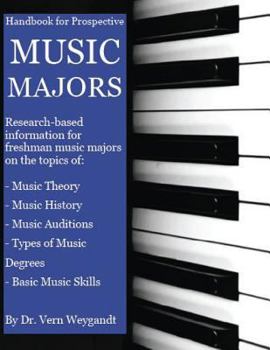Handbook for Prospective Music Majors
Handbook for Prospective MUSIC MAJORS by Dr. Vern Weygandt As the title indicates, this book's intended audience is young adults who are considering pursuit of a music degree. Other resources in the marketplace place focus on philosophical advice, such as how to prepare for auditions and how to study music theory. This handbook offers thoroughly researched methodologies and specific information, which allow students to learn music theory and music history, pick acceptable audition repertoire, and understand the various types of music degree programs. The following briefly illustrates the research and content for each topic: Music Theory - Significant theory course textbooks, peer-reviewed articles, and dissertations were consulted, as well as the course description for A.P. Music Theory and the theory syllabus from the Canadian Royal Conservatory of Music. In addition, a sample of undergraduate collegiate theory diagnostic exams was also included, since they place focus on fundamentals. A comparison of these resources resulted in the inclusion of keys, scales, intervals, triads, triad inversions, rhythm, and meter in the exercises. Music History - Significant music history and music appreciation textbooks, articles, and dissertations were consulted. To whittle down the number of composers and compositions to a manageable, but representative group, a list of each was created and then the total number of pages from each resource was tallied, to assess the relative importance. Three lists were created from this information: a short list of composers who would represent each era, list of representative composers in each era for further consideration, and a list of preeminent, distinguishable compositions. Lastly, recommendations are included that point out performers to consider when searching online video resources. Music Auditions - To determine the most commonly requested college music audition materials, it was important to sample requirements from historically prestigious schools, schools of diverse size and make-up, and both public and private schools from various regions of the U.S. and Canada. Works for each instrument and vocal category were listed, with those that were mentioned most frequently included in this handbook. Music Degree Programs - Program descriptions from historically prestigious schools, schools of diverse size and make-up, and both public and private schools from various regions of the U.S. and Canada were consulted in the creation of this section of the handbook. In addition, college handbooks and degree course requirements from music departments were also reviewed, in order to provide a relevant four-year snapshot for prospective students. Non-negotiables - Based on the research conducted for the aforementioned topics, a list of must-have skills are included that could ensure success for the prospective music major. These skills include basic terms, music reading skills, and introductory piano knowledge.
Format:Paperback
Language:English
ISBN:1724955624
ISBN13:9781724955623
Release Date:August 2018
Publisher:Createspace Independent Publishing Platform
Length:162 Pages
Weight:0.86 lbs.
Dimensions:0.3" x 8.5" x 11.0"
Customer Reviews
0 rating





